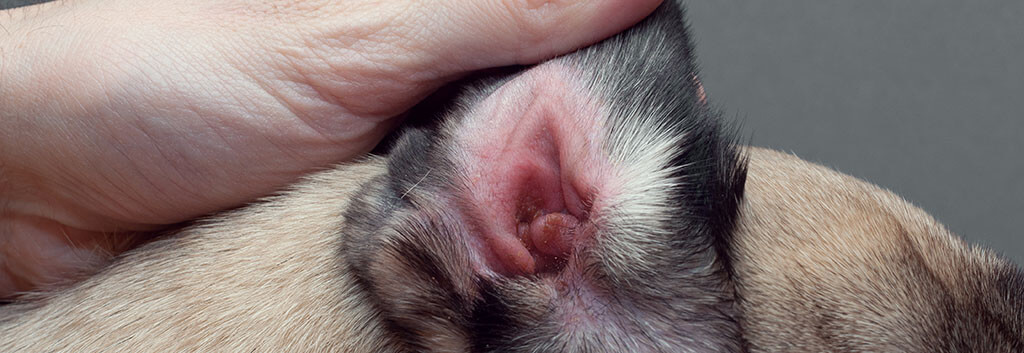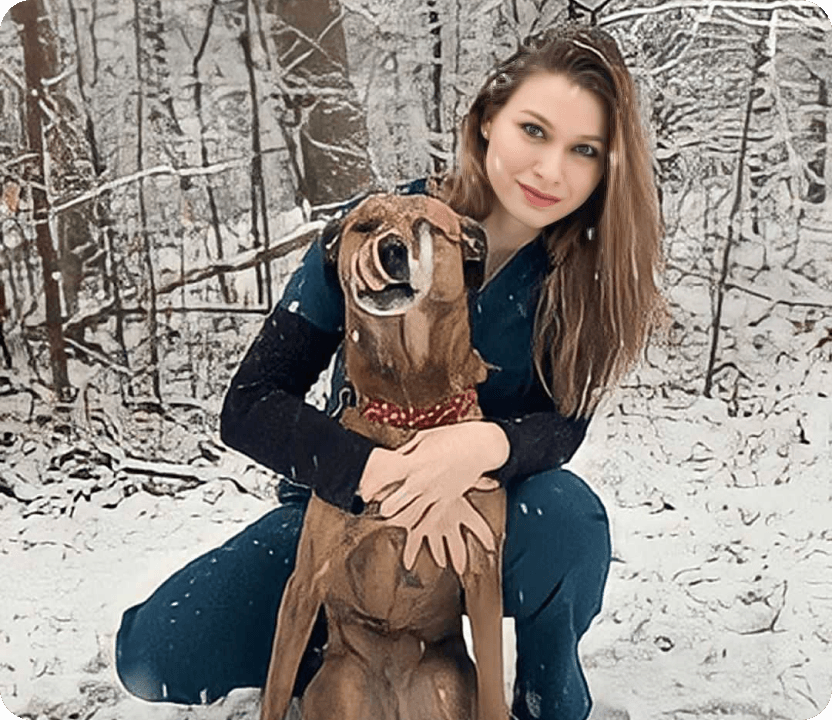Have you ever observed your dog engaging in the act of head shaking? Depending on the cause, it can be both amusing and concerning. However, there are several reasons why your dog might shake their head and not all of those are cause for concern.
Persistent Head Shaking in Dogs: Causes, Concerns, and Care

From ear infections to underlying allergies to the presence of foreign bodies within the ear canal itself, this article will delve into the common causes of head shaking in dogs, diagnosis of those common causes, and options for treatment and prevention. We will also provide guidance on how to discern whether or not your dog’s head shaking warrants increased concern and an examination by your veterinarian to address an underlying cause.
Key facts
- Persistent head shaking in dogs can be amusing or concerning, signaling underlying health issues.
- Ear infections, allergies (food and environmental), parasites (ear mites), foreign bodies (e.g., foxtails), skin disorders (e.g., mange, flea bite dermatitis), and excessive earwax buildup.
- Depending on the cause, treatments may include regular vet exams, flea and tick prevention, topical and systemic medications, alternative therapies, referral to specialists, and surgery for severe cases.
- Regular ear inspections and cleanings, avoiding known allergens, incorporating probiotics and omega-3 fatty acids into the diet, and consistent, year-round flea and tick prevention.
- Daily use of probiotics may help reduce allergy symptoms by supporting the immune system and promoting a healthy gastrointestinal tract.
- While some head shaking is normal, persistent or excessive shaking requires veterinary attention to diagnose and treat the underlying cause, improving the dog’s quality of life.
Common Causes of Head Shaking in Dogs
As stated above, there are several reasons why dogs might shake their heads. Let’s examine a few of the most common reasons for this quirky canine behavior:
Ear infection (otitis)
Ear infections are the most frequently diagnosed cause of excessive head shaking in dogs. Ear infections are caused by an overgrowth of yeast, bacteria, or both, that are normally present within the ear canal. Ear infections can affect the ear canal’s inner, middle, or outer portions, although infections of the outer ear canal (otitis externa) are the most common. Predisposing factors such as underlying allergies, ear conformation (i.e. long, floppy ears), foreign bodies present in the ear canal, and some endocrine diseases (hypothyroidism) can make your dog more prone to developing an ear infection.
When the normal protective barrier of the ear canal is disrupted and an overgrowth of bacteria or yeast occurs, this typically results in significant redness and inflammation of the ear canal, as well as the production of an excessive amount of abnormal debris or discharge. A foul odor may also accompany this discharge. The presence of inflammation, discomfort, discharge, and itchiness causes your dog to shake its head—sometimes excessively—in an attempt to obtain relief.
Most cases of ear infections in dogs will not go away without treatment by your veterinarian, and if left untreated, may lead to permanent changes in your dog’s ear, loss of hearing, or resistant infections.
Allergies (food and environmental)
Allergies are one of the most common underlying causes of ear inflammation and infection in dogs that can result in excessive head shaking. The most common causes of underlying allergies in dogs tend to be food allergies, environmental allergies (atopy), and flea-bite allergies. These allergies result in inflammation and itchiness of the ear canal that can manifest as frequent or excessive head shaking in dogs.
Food allergies occur when your dog’s immune system overreacts to a particular protein in their diet that their body views as “foreign.” The most commonly cited offending proteins include beef, chicken, dairy products, eggs, wheat, and soy. Dogs with food allergies tend to be itchy all over their body which also often results in some degree of hair loss. Recurrent ear infections can be an indication of an underlying food allergy in dogs, while some dogs may also exhibit gastrointestinal signs such as vomiting or diarrhea. Clinical signs in dogs with food allergies tend to be year-round and usually appear before one year of age. Signs typically resolve once the offending allergen has been identified, although the process can prove to be difficult and time-consuming and usually involves an elimination diet trial.
Environmental allergies (atopy) on the other hand, occur when allergens such as dust, pollen, mold, or weeds/grasses, enter your dog’s body via a damaged skin barrier that is normally considered “protective” against these allergens. The dog’s body views these allergens as “foreign” which releases numerous inflammatory cells that cause increased itching and scratching, making the affected areas of skin even more susceptible to environmental allergen exposure in the future and, therefore, continuation of the itch cycle. The primary symptom of environmental allergies (atopy) is pruritus (itching) which most commonly affects the face, feet, ears, armpits, abdomen, and the inner surfaces of the front and rear limbs. Dogs typically begin to show clinical signs between one and three years of age, and signs may be more “seasonal” initially. Diagnosis of atopy is one of exclusion after other underlying causes, such as fleas, have been ruled out. Treatment focuses on the management of the pruritus (itchiness) and is usually lifelong.
Parasites
Ear mites (Otodectes cynotis) are contagious parasites that live in the ears of their host and feed on the natural oils and waxes present in your dog’s ears. Ear mites are typically spread via direct contact with an infected dog and tend to be more commonly diagnosed in puppies (especially in very crowded living situations) and cats. Ear mite infestations generally produce excessive amounts of black or dark brown discharge that resembles coffee grounds and usually result in itchiness and inflammation of the ear canals and frequent head shaking. Diagnosis and treatment are normally straightforward.
Foreign Bodies
Sudden, violent head shaking and pawing at the ear may indicate that your dog has something lodged in their ear canal. One of the most common foreign bodies in the ear canal in dogs is the foxtail or grass awn. Dogs acquire grass awns when running through tall grass. These grass seeds contain numerous sharp bristles that allow the foxtail to embed itself in the lining of the ear canal, resulting in significant irritation, inflammation, and sometimes secondary bacterial infection. While removal of the offending grass awn is curative, this procedure may require sedation or general anesthesia.
Skin Disorders
The most common skin disorders that can affect the ears or ear flaps (pinnae) and result in increased head shaking include sarcoptic mange, flea bite dermatitis, insect bites, and ear margin seborrhea.
Sarcoptic (“scabies”) mange mites burrow into the skin of dogs and cause intense itching, alopecia, and crusting on areas of the skin such as the ear flaps (pinnae), elbows, and hocks but can also affect the entire body. Sarcoptic mites are highly contagious to other dogs, as well as humans. Diagnosis requires skin scraping, although it is not uncommon to have ‘negative’ skin scrapes even when sarcoptic mange is suspected. The prognosis is generally good but often requires several weeks of treatment to completely resolve.
Flea Bite dermatitis is one of the most common skin conditions diagnosed in dogs. Hypersensitivity to the flea saliva when feeding on your dog’s blood results in intense itching and biting, chewing, or scratching in classic areas such as the base of the tail, hindlimbs, and inguinal region, although severe flea infestations can cause lesions over the entire body, including the ear flaps (pinnae). The use of consistent, year-round flea prevention is of the utmost importance, especially for allergic dogs.
Insect bites from mosquitoes and flies can also cause inflammation of the ear flaps (pinnae). Although a worldwide problem, the occurrence and severity vary with the season and environment and typically affects dogs, cats, and horses. The bites from these insects cause small, hard, round bumps with central bloody crusts that itch. The most severely affected areas of the ear flaps are the tips, as well as the folded surface of the outer ear in dogs with large, floppy ears. Treatment includes fly repellents, in the form of sprays and topical ointments, and environmental management of the fly population during peak seasons. Treatment of secondary infections with medications may also be necessary.
Ticks can also cause increased itchiness and discomfort in the ear when they attach and burrow into the skin in or around your dog’s ear. Ticks can also carry numerous diseases and should be promptly and carefully removed by you or your veterinarian. If you and your dog spend any time outdoors or in grassy or wooded areas, the use of consistent flea and tick prevention is strongly recommended.

Ear Margin Seborrhea
The cause of this condition is unknown but is common in the Dachshund breed, although any dog breed with long, floppy ears may be affected. Lesions usually begin at the apex of the ear flaps on both sides but can progress to include the entire ear margin. Lesions appear as waxy, yellowish scales that adhere to the base of the hair follicle and result in the hair along the ear margin being very easily removed, leaving behind the shiny surface of the skin of the affected ear. In severe cases, the ear flaps (pinnae) may become swollen and develop fissures (“cracks”) that are extremely uncomfortable for the dog and lead to more frequent head shaking. Treatment includes both topical and systemic medications and may require lifelong management.
Excessive wax buildup
Cerumen, or earwax, is a normal component of all dog ears. It is produced and secreted by special glands in the ear to help move dirt and debris up and out of the ear canal. This is the method by which the ear naturally ‘cleans itself.’
However, some breeds of dogs are prone to developing excessive amounts of earwax that may be unhealthy. Breeds such as Cocker Spaniels and English Bulldogs commonly have excessive amounts of earwax–due to genetic conditions or underlying allergies–that can predispose them to recurrent ear inflammation, infections, and increased head shaking. Other breeds with increased length of their ear canals, like Basset Hounds, may also be prone to producing too much earwax. Finally, Poodle breeds grow hair in their canals which can lead to earwax getting trapped in the hair, creating a physical blockage of the ear canal that then predisposes them to inflammation and infection of the ear canal as evidenced by increased head shaking.
Diagnosing the Cause of Head Shaking
Because there are several reasons why your dog might keep shaking his head, it is important to have your dog examined by your veterinarian as soon as possible to identify the underlying cause and most effective treatment options. A thorough physical examination will initially be performed, and then your veterinarian will most likely utilize one or more of the following diagnostic tests to determine the underlying cause of your dog’s excessive head shaking:
- Ear cytology: a sample of the debris present within the ear canal is taken using a cotton swab and is then viewed under the microscope to determine the presence of yeast, bacteria, or ear mites.
- Skin scrapings: superficial skin scrapings using a dulled surgical blade are necessary for diagnosis of Sarcoptic mange and are examined under a microscope to identify the mites.
- Flea combing and flea control: the consistent use of flea preventives can be used as a diagnostic tool to rule out the possibility of underlying parasitic (fleas) causes of dermatitis of the ear flaps (pinnae).
- Bacterial culture and susceptibility: should be considered in non-responsive or recurrent ear infections to determine the causative bacteria and the most effective medication to treat with.
- Biopsy and histopathology: these samples, obtained surgically, are especially important for diagnosing autoimmune conditions and non-responsive conditions of the ear flaps (pinnae).
- Elimination diet trial: this is the gold standard for diagnosing an underlying food allergy. During the trial, your dog is fed a hydrolyzed (the proteins are broken down into VERY small pieces to avoid detection by the immune system) diet or a novel protein diet (a protein like kangaroo that your pet has not been fed before) for 6-8 weeks to see if the clinical signs improve. If symptoms resolve, proteins are added back to the diet one at a time until symptoms return. Based on these findings, a list of offending proteins (food allergens) can be made and avoided.
- Allergy testing: via the skin (intradermal) or blood (serology) can aid in identifying specific environmental allergens that your dog reacts to. Allergen-specific immunotherapy can then be tailored to your pet’s specific needs.
- Bloodwork: for underlying medical conditions such as hypothyroidism that can make your dog more prone to developing ear infections.
Referral: to a veterinary dermatologist for complex cases that are not responding to the prescribed course of treatment.
Treatment Options
As stated previously, treatment for excessive head shaking in dogs depends upon the underlying cause. Many of these conditions often necessitate long-term management rather than a “quick cure.” The list below addresses the various treatment modalities that are frequently utilized by veterinarians to treat or manage this condition in your dog:
- Regular exams and rechecks by your veterinarian: It is important to follow the prescribed treatment by your veterinarian. This will entail regular rechecks to evaluate the response to treatment and adjust as necessary. Doing so will hopefully avoid relapses, or at least reduce the severity, of your dog’s underlying condition.
- Consistent flea and tick prevention: Both allergic AND non-allergic dogs should be on year-round, veterinary-prescribed flea (and tick) prevention. Treatment of ALL pets in the home is crucial for the management of many allergic conditions in dogs. Many of these preventives will also treat sarcoptic mange and ear mites.
- Topical ear medications: The majority of ear infections can be treated with topical ear ointments that usually contain a combination of an antibiotic, an antifungal, and a steroid. These medications are applied after the affected ear(s) is cleaned thoroughly with a medicated cleaner and allowed to dry. These ointments may be applied once daily, twice daily, or once, depending on the formulation.
- Medicated ear cleaners: These ear cleaners generally contain a combination of antibacterial and antifungal (for yeast) ingredients. They are recommended for cleaning the affected ears before applying medication, or as part of a routine to prevent future ear infections. Many of these ear cleaners can be obtained without a prescription.
- Systemic medications: Many of the underlying causes of increased head shaking in dogs, such as environmental allergies, require management with oral or injectable medications. Prescription medications like ApoquelⓇ and CytopointⓇ suppress the inflammatory response elicited by your dog’s body in response to offending allergens. Resistant, recurrent, or non-responsive ear infections may require extended treatment with oral antibiotics and antifungals. If the ear infection or inflammation is particularly painful, an oral NSAID (non-steroidal anti-inflammatory drug) such as carprofen might be added to the treatment regimen. Pet parents should be aware that underlying conditions like allergies will require long-term or even lifelong management.
- Alternative therapies: Integrative medicine techniques such as acupuncture and cold laser or phototherapy (light therapy) can aid in reducing inflammation of the affected ear(s) and also speed healing.
- Referral to a veterinary dermatologist: Consulting with or referral to a veterinary dermatologist is an option for non-responsive or complex cases. Your primary veterinarian and the specialist will work together to provide the most effective treatment plan for your dog’s underlying condition.
Surgery: In cases of chronic ear infections or severe conditions, surgery might be necessary. Surgery to remove foreign bodies such as grass awns that are lodged in the ear canal may be necessary. A more advanced procedure for end-stage, chronically infected ears called a TECA-BO (Total Ear Canal Ablation and Bulla Osteotomy) is utilized when medical treatment is no longer helping the patient, the ear canal is significantly narrowed, and debris is unable to be removed with routine cleaning. The TECA-BO effectively removes the infected, abnormal tissue within the ear canal and improves the patient’s quality of life. This surgical procedure is typically performed by a board-certified veterinary surgeon.

Allergies and the Role of Probiotics
As discussed previously, underlying allergies result in inflammation and itchiness of the ear canal when your dog’s immune system overreacts to allergens (proteins) that their body sees as “foreign.” The inflammation and itching result in increased or excessive head shaking. Regular administration of probiotics to your pet may help reduce allergy symptoms.
Probiotics are beneficial bacteria that live in your dog’s intestines and occur naturally (e.g. the live cultures found in yogurt) but can also be given as supplements, usually by adding to their food. The most commonly utilized probiotics are members of the Lactobacillus, Bifidobacterium, Enterococcus, and Saccharomyces spp.
Because your dog’s gastrointestinal tract contains approximately 70% of their immune system, routinely giving your dog a probiotic can help prevent ear conditions (and head shaking) by strengthening the immune system and preventing disease-causing pathogens from reaching the rest of the body, reducing inflammation, promoting the presence of beneficial bacteria within the gastrointestinal tract, and maintaining the health of the protective skin barrier. Certain strains of probiotics have even recently been shown to reduce anxiety!
However, probiotics are only effective when given in adequate amounts. So, you must choose wisely when deciding which probiotic to give to your dog or cat. For example, the current recommendation for dogs is 1-10 billion CFUs (Colony Forming Units) per day. Probiotics can be given on an as-needed basis (i.e. before a stressful event like boarding) or can be given daily as part of your dog’s long-term healthcare plan. When choosing a probiotic, the label should include an expiration date, the exact species of bacteria that it contains, the number of microorganisms in the product, and a guarantee for the number of live organisms. The manufacturer of the probiotic should be able to provide proof of the product’s effectiveness by way of a scientific study. Two examples of such probiotics are FortifloraⓇ and ProviableⓇ.
Preventive Measures and Regular Care
Common causes of excessive head shaking in dogs such as ear infections can often be prevented by performing regular inspections and cleaning of their ears. However, care should be taken when cleaning your dog’s ears to prevent damage to the ear canal and discomfort or increased stress for your pet.
- To properly clean your dog’s ears, first make sure that your pet is properly positioned, either sitting in front of you with his rear end between your legs or, if a larger breed dog, you may find it helpful to have them sit in the corner of a room with his one side against the wall while you are standing on the other side.
- Gently grasp one ear flap (pinna) and hold it up (vertically) to visualize and straighten the ear canal (normally has a vertical and then horizontal component).
- While holding the ear flap with one hand, gently squeeze some cleaning solution into your dog’s ear canal. You should use enough to fill the ear canal. Try to avoid placing the tip of the bottle in your dog’s ear canal to prevent the spread of bacteria and/or yeast.
- While continuing to hold the ear flap with one hand, gently massage the base of the ear below the opening of the canal for approximately 30 seconds. This will help the cleaning solution break up the debris that is present within your dog’s ear canal.
- While still holding the ear flap, use a cotton ball to wipe away debris from the inner part of the ear flap and upper ear canal.
- Allow your dog to shake his head. This will move any remaining cleaning solution and debris up and out of the ear canal.
- Once again, remove any remaining debris or solution using a cotton ball. NEVER use a Q-tip (cotton-tipped applicator) to clean your dog’s ears as it could, if used incorrectly, damage your dog’s ear drum or push debris deeper into the ear canal.
- Praise your dog and provide treats or toys.
- Repeat the above process with the other ear.
- If your dog appears to be in pain and will not allow you to clean their ears, consult your veterinarian as soon as possible. If your dog’s ears are being treated with a topical ear medication, clean the ears first, allow them to dry for about 10 minutes, and then apply the prescribed medication.
In addition, dogs with known, underlying allergies (environmental or food) should try to avoid the offending allergens as much as possible. For example, if your dog is diagnosed with a specific food allergy, you should avoid those ingredients that promote inflammation of your dog’s skin, and more specifically, their ears. Choosing diets that contain probiotics and omega-3 fatty acids, or supplementing these in your dog’s food, may also help to prevent recurrent ear infections that result in increased head shaking.
Finally, your dog should have regular exams performed by your veterinarian to detect health problems, such as ear infections, early. By doing so, your dog will be more likely to respond quicker to the chosen treatment.
Conclusion
As we have discussed in this article, head shaking is considered a normal behavior in dogs that aids in moving debris or foreign material, like water, up and out of the ear canal. However, if your dog keeps shaking their head, the shaking seems to occur suddenly and violently, or your dog seems to be in any pain or discomfort, you should seek veterinary care immediately. Your veterinarian will be able to properly diagnose the underlying cause of your dog’s excessive head shaking and then determine the most appropriate treatment plan to get your furry friend on the road to recovery.
FAQs
What causes persistent head shaking in dogs?
Common causes include ear infections, allergies (both food and environmental), parasites like ear mites, foreign bodies in the ear canal, skin disorders, and excessive wax buildup.
When should I be concerned about my dog shaking their head?
If the head shaking is persistent, appears suddenly and violently, or if your dog shows signs of pain or discomfort, it’s important to seek veterinary care.
How are ear infections in dogs diagnosed?
Diagnosis may involve a thorough physical examination by a veterinarian, ear cytology to check for yeast and bacteria, skin scrapings, and possibly allergy testing or blood work for underlying conditions.
Can dietary changes help dogs with allergies that cause head shaking?
Yes, for food allergies, an elimination diet trial can help identify allergens. Incorporating probiotics and omega-3 fatty acids may also help manage and prevent allergic reactions.
Are there any preventive measures I can take to stop my dog from shaking their head?
Regular ear inspections and cleanings, avoiding known allergens, maintaining consistent flea and tick prevention, and ensuring a balanced diet can all help prevent conditions that cause head shaking.
Can probiotics really help with my dog’s head shaking?
Probiotics may help reduce symptoms of allergies by supporting the immune system and maintaining a healthy gut, which is closely linked to overall immune health.
What should I do if my dog suddenly starts shaking their head violently?
If your dog suddenly starts shaking their head violently, it could indicate a foreign body in the ear or an acute infection. Seek veterinary care immediately to address the issue.
Sources
https://yourpetandyou.elanco.com/us/health-and-care/4-reasons-why-dogs-shake-their-head
https://www.petmd.com/dog/conditions/ears/head-shaking-dogs-when-worry
https://bettervet.com/resources/pet-symptoms/dog-head-shaking
https://firstvet.com/us/articles/why-is-my-dog-shaking-his-head
https://www.vetniquelabs.com/blogs/vets-corner/why-does-my-dog-keep-shaking-his-head
 J
J




